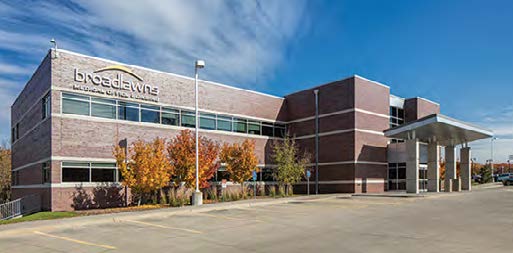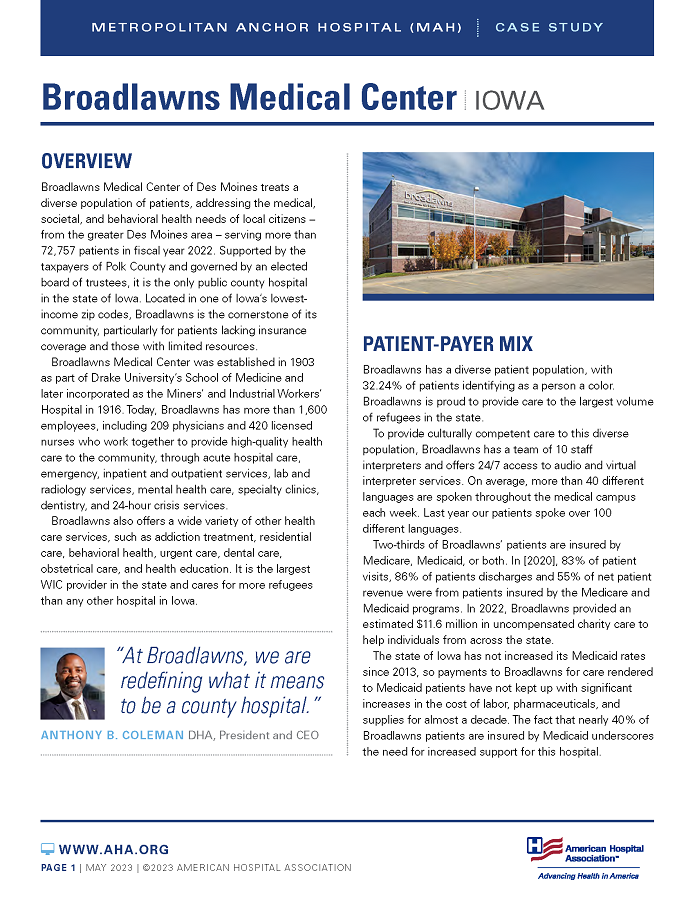

Broadlawns Medical Center | Iowa
Metropolitan Anchor Hospital (MAH) | Case Study
Overview
 Broadlawns Medical Center of Des Moines treats a diverse population of patients, addressing the medical, societal, and behavioral health needs of local citizens – from the greater Des Moines area – serving more than 72,757 patients in fiscal year 2022. Supported by the taxpayers of Polk County and governed by an elected board of trustees, it is the only public county hospital in the state of Iowa. Located in one of Iowa’s lowest-income zip codes, Broadlawns is the cornerstone of its community, particularly for patients lacking insurance coverage and those with limited resources.
Broadlawns Medical Center of Des Moines treats a diverse population of patients, addressing the medical, societal, and behavioral health needs of local citizens – from the greater Des Moines area – serving more than 72,757 patients in fiscal year 2022. Supported by the taxpayers of Polk County and governed by an elected board of trustees, it is the only public county hospital in the state of Iowa. Located in one of Iowa’s lowest-income zip codes, Broadlawns is the cornerstone of its community, particularly for patients lacking insurance coverage and those with limited resources.
Broadlawns Medical Center was established in 1903 as part of Drake University’s School of Medicine and later incorporated as the Miners’ and Industrial Workers’ Hospital in 1916. Today, Broadlawns has more than 1,600 employees, including 209 physicians and 420 licensed nurses who work together to provide high-quality health care to the community, through acute hospital care, emergency, inpatient and outpatient services, lab and radiology services, mental health care, specialty clinics, dentistry, and 24-hour crisis services.
Broadlawns also offers a wide variety of other health care services, such as addiction treatment, residential care, behavioral health, urgent care, dental care, obstetrical care, and health education. It is the largest WIC provider in the state and cares for more refugees than any other hospital in Iowa.
“At Broadlawns, we are redefining what it means to be a county hospital.”
Anthony B. Coleman
DHA, President and CEO
Patient–Payer Mix
Broadlawns has a diverse patient population, with 32.24% of patients identifying as a person a color. Broadlawns is proud to provide care to the largest volume of refugees in the state.
To provide culturally competent care to this diverse population, Broadlawns has a team of 10 staff interpreters and offers 24/7 access to audio and virtual interpreter services. On average, more than 40 different languages are spoken throughout the medical campus each week. Last year our patients spoke over 100 different languages.
Two-thirds of Broadlawns’ patients are insured by Medicare, Medicaid, or both. In 2020, 83% of patient visits, 86% of patients discharges and 55% of net patient revenue were from patients insured by the Medicare and Medicaid programs. In 2022, Broadlawns provided an estimated $11.6 million in uncompensated charity care to help individuals from across the state.
The state of Iowa has not increased its Medicaid rates since 2013, so payments to Broadlawns for care rendered to Medicaid patients have not kept up with significant increases in the cost of labor, pharmaceuticals, and supplies for almost a decade. The fact that nearly 40% of Broadlawns patients are insured by Medicaid underscores the need for increased support for this hospital.
Broadlawns' Unique Approach to Care
Produce Prescription Program
The Polk County Produce Prescription Program (PCPPP) connects diabetic patients from Broadlawns’ Family Health Center to medical providers who write prescriptions for free vouchers for fruits and vegetables. By helping lower-income families purchase fresh, nutritious foods instead of processed or fast food, the program has seen measurable results.
Serving 179 individuals, nine in ten participants rated the program as positive or very positive, and a majority reported eating more fruits and leafy vegetables after receiving the prescription for six months. Additionally, self-reported patient data, evaluated by the Broadlawns medical team, has demonstrated significant impact on patient health, including decreases in hemoglobin A1C and cholesterol. To build on the program’s success, Broadlawns was awarded additional funding to introduce the program in its Pediatric Clinic.
TEACH & TECH Program
Broadlawns’ TEACH and TECH (Training and Education for a Career in Healthcare) job training programs were established in 2016 to raise awareness of health care career opportunities among youth and adults in the Des Moines community.
Participants are introduced to Broadlawns’ work culture, explore career paths, and complete basic and advanced Certified Nursing Assistant (CNA) training. The majority of participants are selected from the neighboring community, whose residents have the highest poverty and unemployment levels in Des Moines. Over the past six years, more than 130 individuals have graduated from the TEACH/TECH job training program, including nearly half of whom were hired by Broadlawns following graduation and continue working for the hospital to this day.
The Health Ambassador Program
Broadlawns’ Health Ambassador program links health coaches and pharmacy educators with community members to train them to share information, recognize potential health concerns, and help improve health literacy. The program holds community enrollment events to attract individuals living with diabetes and/or hypertension. Health ambassadors staff enrollment events and follow up regularly with individuals who enroll in the program, which has the capacity to serve roughly 100 Iowans.
Metropolitan Anchor Hospitals Need Support
Metropolitan Anchor Hospitals (MAHs) like Broadlawns attend to the sickest, poorest, and those high-need individuals who benefit most from community-based programs and support services. MAHs serve patients who have high rates of chronic diseases and complex health conditions. With more stable resources, MAHs like Broadlawns can expand their innovative programs, improve patient outcomes, and further enhance their communities’ health. To respond to community needs and financial pressures, MAHs need additional financial support to help address rapidly rising health care costs.


